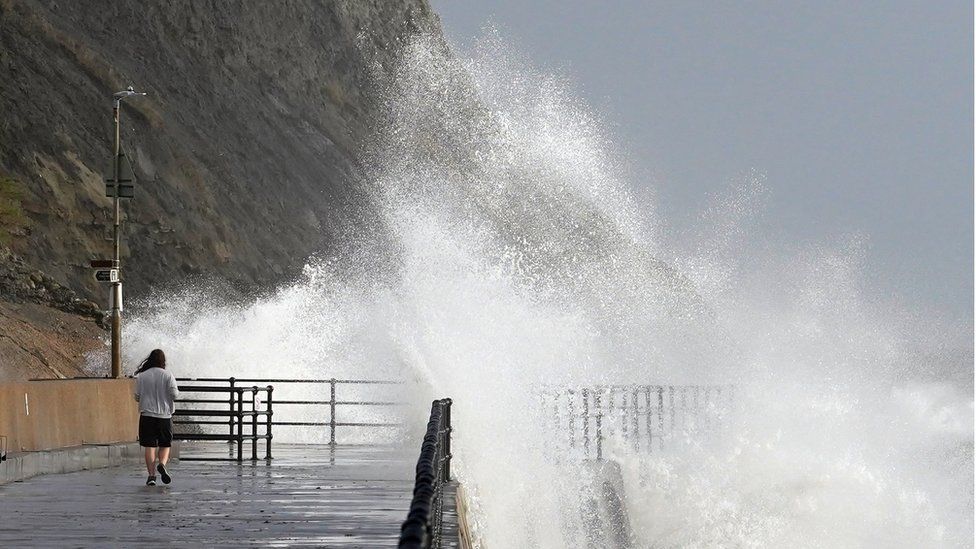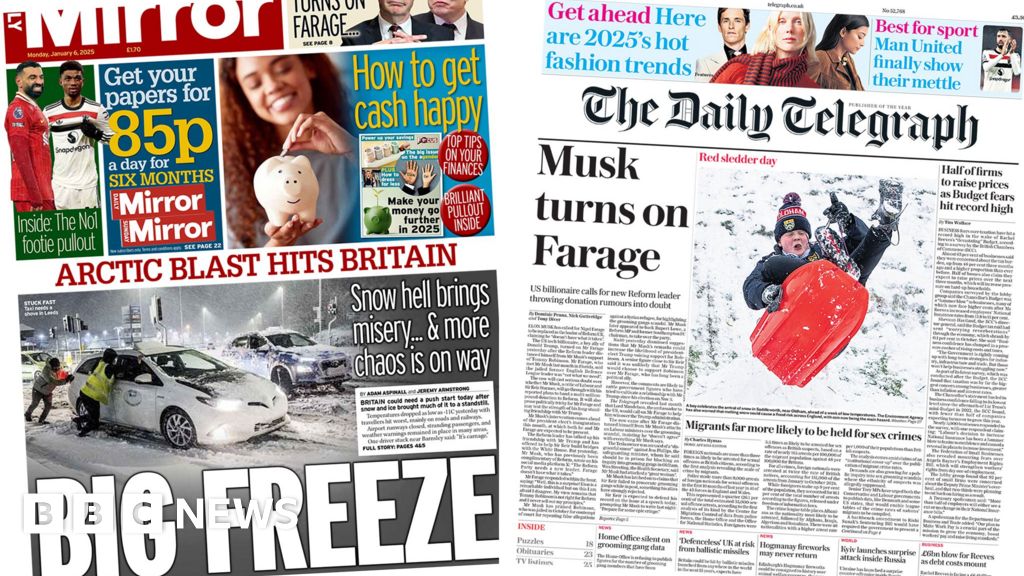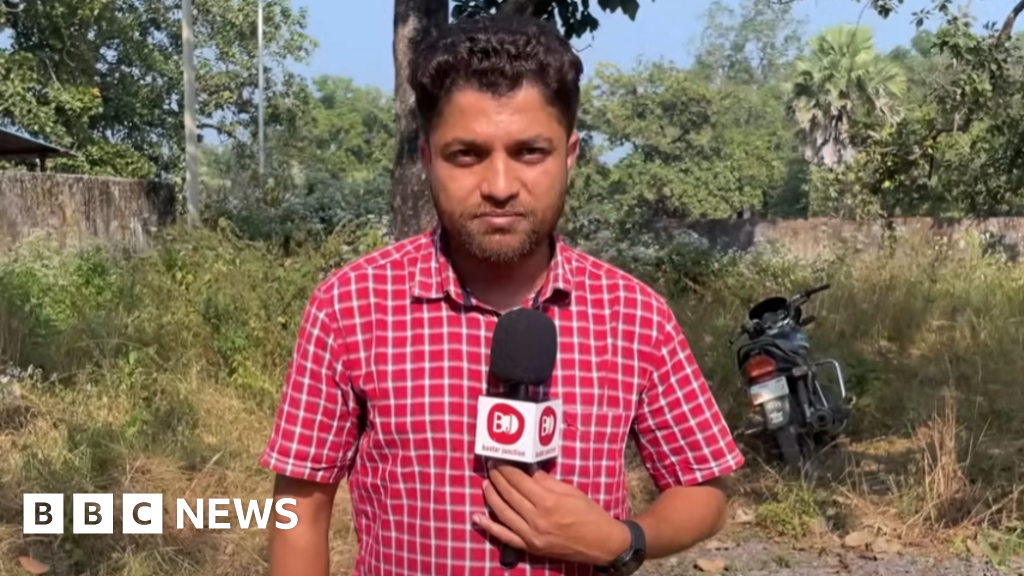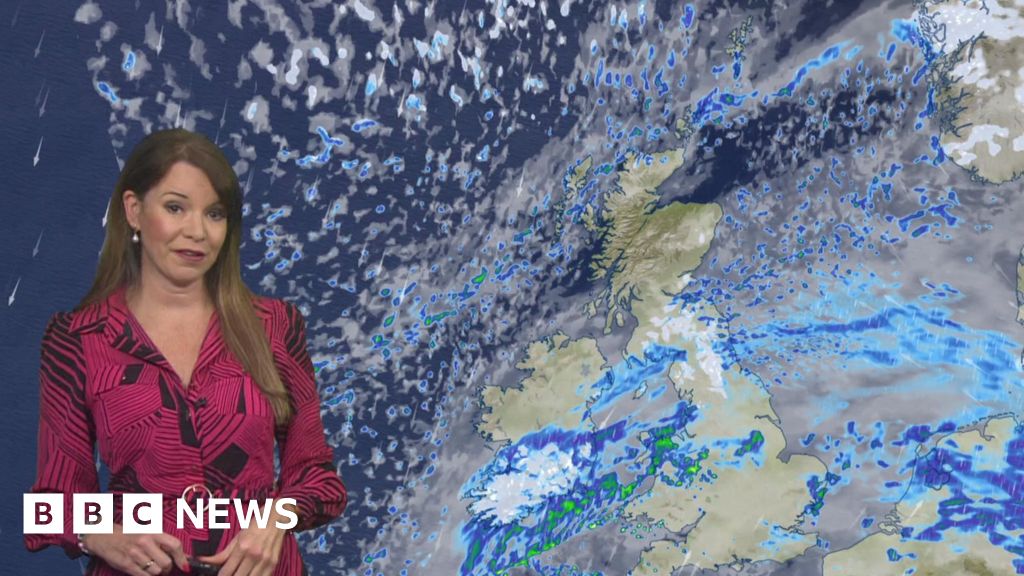 Image source, Gareth Fuller
Image source, Gareth Fuller
Waves crash over the promenade in Folkestone, Kent.
By Ana Nicolaci da Costa
BBC News
Warnings for wind and rain are in force for northern England and north-east Scotland as Storm Debi sweeps across the UK.
The Met office alerts come as Debi, the fourth named storm of the season, caused power cuts and travel disruption in some places.
Gusts of over 70mph (112.7km/h) have been recorded in Wales and Northern Ireland.
There is also a possible danger to life from flying debris and large waves.
The rain and wind first hit Northern Ireland and the Republic of Ireland, then Wales, before moving eastwards and into the North Sea on Monday evening.
In Northern Ireland, Storm Debi caused road closures and some disruption to the public transport network. NIE Networks said about 3,000 customers were without power, mainly around Craigavon, Newry and Downpatrick.
Gusts of up to 77mph battered parts of the Welsh coast after a yellow weather warning across north, mid and west Wales, while winds of 74mph were recorded at Killowen, Northern Ireland, and 68mph on the Isle of Man.
A Met Office amber wind warning - meaning a potential risk to life and property - was in place for parts of south-west Northern Ireland in the morning and remained until 16:00 in parts of north-west England, including Cumbria, Lancashire and Merseyside.
Yellow weather warnings for wind were also in place for much of northern England and Wales until 18:00. This has been extended until 21:00 for much of the north of England, including Lincoln, Sheffield and Manchester up to Carlisle and Newcastle.
A yellow warning for rain until 21:00 has also been issued for parts of north-east Scotland which were battered by Storm Babet last month, including Inverness, and Brechin in Angus, where hundreds of homes had to be evacuated after the river South Esk breached its banks.
Storm Debi developed in the Republic of Ireland, where red weather warnings were in place earlier. About 100,000 homes and businesses have lost power, with the number expected to rise.
A woman was taken to hospital after being hit by flying debris in Limerick and some schools were forced to close.
Image source, Claudia Savage
Image caption,A car on a flooded road in County Tyrone. Storm Debi caused power cuts in Northern Ireland and the Republic of Ireland
BBC Weather's Simon King said Storm Debi could lead to some localised flooding, especially in Northern Ireland and eastern Scotland.
He said the stormy conditions will be especially felt around Irish Sea coasts and there may be branches or trees down and potentially damage to buildings.
The Met Office said severe weather could lead to the flooding of homes and businesses - with possible fast-flowing or deep floodwater causing a danger to life.
Spray and flooding could also lead to difficult travel conditions, with some road and bridge closures, and disruption to rail, air and ferry services.
The Met Office said mobile phone coverage could also be affected and injuries and danger to life could occur from large waves and beach material being thrown onto sea fronts, coastal and road properties.
British Airways said it had to "make a small number of cancellations" due to the bad weather, which has reduced the number of flights air traffic controllers will allow to land per hour.
There could be more unsettled weather on Tuesday morning with a yellow warning for thunderstorms in place for the south of England.
Met Office spokesman Stephen Dixon said: "There will be band of squally showers from 05:00.
"We could see some sudden downpours within that band of thundery showers, with 15-20mm of rain in a relatively short period of time, gusty winds and thunder and lightning."
The latest storm comes after Storm Ciarán caused flooding and disruption across the Channel Islands and southern England, while another recent storm, Babet, flooded nearly 600 properties in Lincolnshire.
Experts say a warming atmosphere increases the chance of intense rainfall and storms.
However, many factors contribute to extreme weather and it takes time for scientists to calculate how much impact climate change has had on particular events - if any.
The world has already warmed by about 1.1C since the industrial era began and temperatures will keep rising unless governments around the world make steep cuts to emissions.
Additional reporting by Emily Atkinson & Harrison Jones
How have you been affected by Storm Debi? You can share with us by emailing haveyoursay@bbc.co.uk.
Please include a contact number if you are willing to speak to a BBC journalist. You can also get in touch in the following ways:
If you are reading this page and can't see the form you will need to visit the mobile version of the BBC website to submit your question or comment or you can email us at HaveYourSay@bbc.co.uk. Please include your name, age and location with any submission.
Find out the weather forecast for your area, with an hourly breakdown and a 14-day lookahead, by downloading the BBC Weather app: Apple - Android - Amazon
The BBC Weather app is only available to download in the UK.
 (1).png)
 1 year ago
17
1 year ago
17


















